Best BuiltWith Alternatives in 2025
Have you ever stumbled on a website that drew you in instantly and you wished you could find out more about how it works?
The need to strip websites to their bare bones is regular in the life of a Computer Science grad like me, and BuiltWith seemed to be the solution for it.
BuiltWith is a profiling tool that tells you the tech stack used in a given website. It seemed incredible when not only the technology used, but also programming languages, widgets, advertisements, and documentation analytics were listed immediately in a click.
Now, in case you are not aware of what a “technology lookup tool” is, here’s a short description.
Technology Lookup Tools
These are software applications or services that analyze and identify the technologies used on websites. These tools scan websites to detect various components, such as content management systems, web servers, frameworks, analytics tools, advertising networks, and other technologies. They are widely used by businesses for market research, competitive analysis, lead generation, and technology trend analysis.
Key Features of Technology Lookup Tools
- Technology Detection: Identify the various technologies a website uses, including CMS, web servers, JavaScript libraries, and more.
- Market Analysis: Provide insights into technology trends, adoption rates, and market penetration across different industries and geographies.
- Lead Generation: Help businesses find potential customers based on the technologies they use, enabling targeted sales and marketing efforts.
- Competitor Analysis: Allow businesses to track the technology stacks of competitors to understand their technical capabilities and strategies.
- API Access: Offer API access for integrating technology lookup capabilities into other applications, enabling automated data retrieval and analysis.
- Historical Data: Provide historical data on technology usage, allowing users to see how a website’s technology stack has evolved over time.
- Browser Extensions: Some tools offer browser extensions for quick and easy access to technology profiles of websites while browsing.
However, I soon began to run into some shortcomings. For starters, BuiltWith is a website profiler at the core. As my use case broadened outside the engineering college curriculum and took a more diverse, industry-oriented form, I found that the tool didn't quite match my business needs.
The second factor was price. As of June 2024, BuiltWith charges a whopping $295 a month for its Basic plan which is more restricted than their "fully featured most popular" Pro plan which costs $495 a month, and the Team Plan, which costs $995. The Free plan is obviously unsuitable for professional use.
Although the best value is the team plan, if you are looking at it from a price-to-value ratio for a team.
I started to hunt for BuiltWith alternatives oriented towards sales and marketing. I wanted tools that not just profile the technology stack like BuiltWith but also help the marketing workflow consciously.
I wasn't disappointed in the options I found, especially the last one.
Let's explore some of these technology profilers to see what sets them apart from the rest.
Wappalyzer
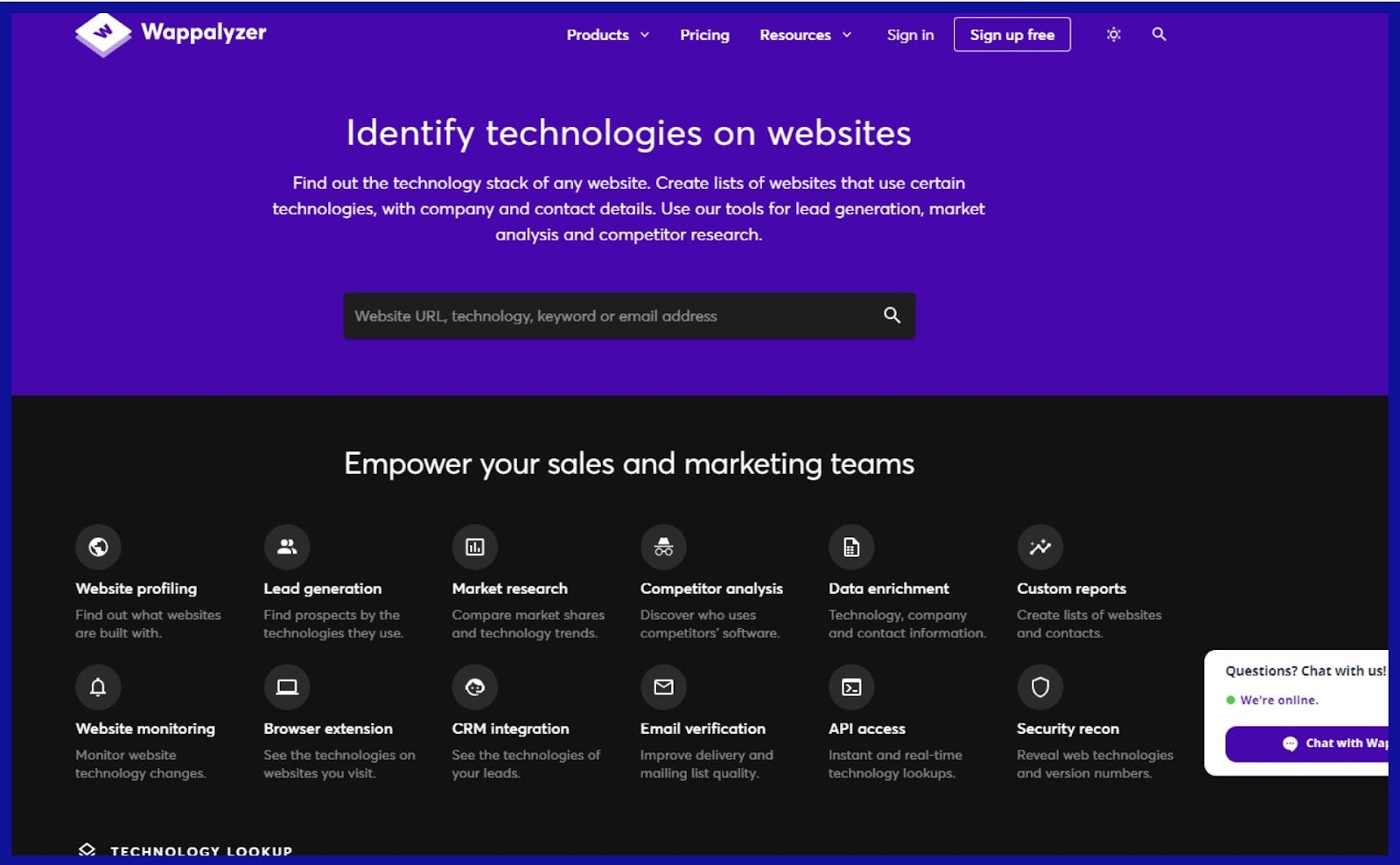
Wappalyzer is a similar technology lookup tool.
It's a great alternative to BuiltWith if you're looking for slightly cheaper options. Wappalyzer is a competent data provider and it's functionally similar to BuiltWith.
It lets users perform limited technology lookups for free, beyond which a free account is needed to continue. If the user needs to exceed 50 lookups a month, then Wappalyzer has paid options starting from $250 a month.
Wappalyzer offers a dedicated option for lead generation that works in tandem with the technology profiling tool.
It lets the user create and export custom reports for any web technology or keyword based on industry, website traffic and location.
It's also diverse in integration, offering an extension that helps with integrating Wappalyzer into daily workflow.
Pros:
- Comprehensive Technology Detection: Identifies a wide range of technologies used on websites, including CMS, e-commerce platforms, web frameworks, server software, analytics tools, and more.
- Browser Extension: Offers a convenient browser extension that allows users to quickly analyze websites without leaving the current page.
- Regular Updates: Frequently updated to recognize new technologies and improve detection accuracy.
Cons:
- Subscription Cost: Advanced functionalities and detailed reports require a paid subscription.
- Detection Limitations: May not always detect less common or custom-built technologies accurately.
- Data Privacy Concerns: Some users worry about data collected through the browser extension.
SimilarTech
SimilarTech is a sales intelligence and insights platform that works fine for just profiling web technologies. The results have sufficient depth and SimilarTech also classifies the technologies by category such as Marketing, Information Technology, and Business Solutions.
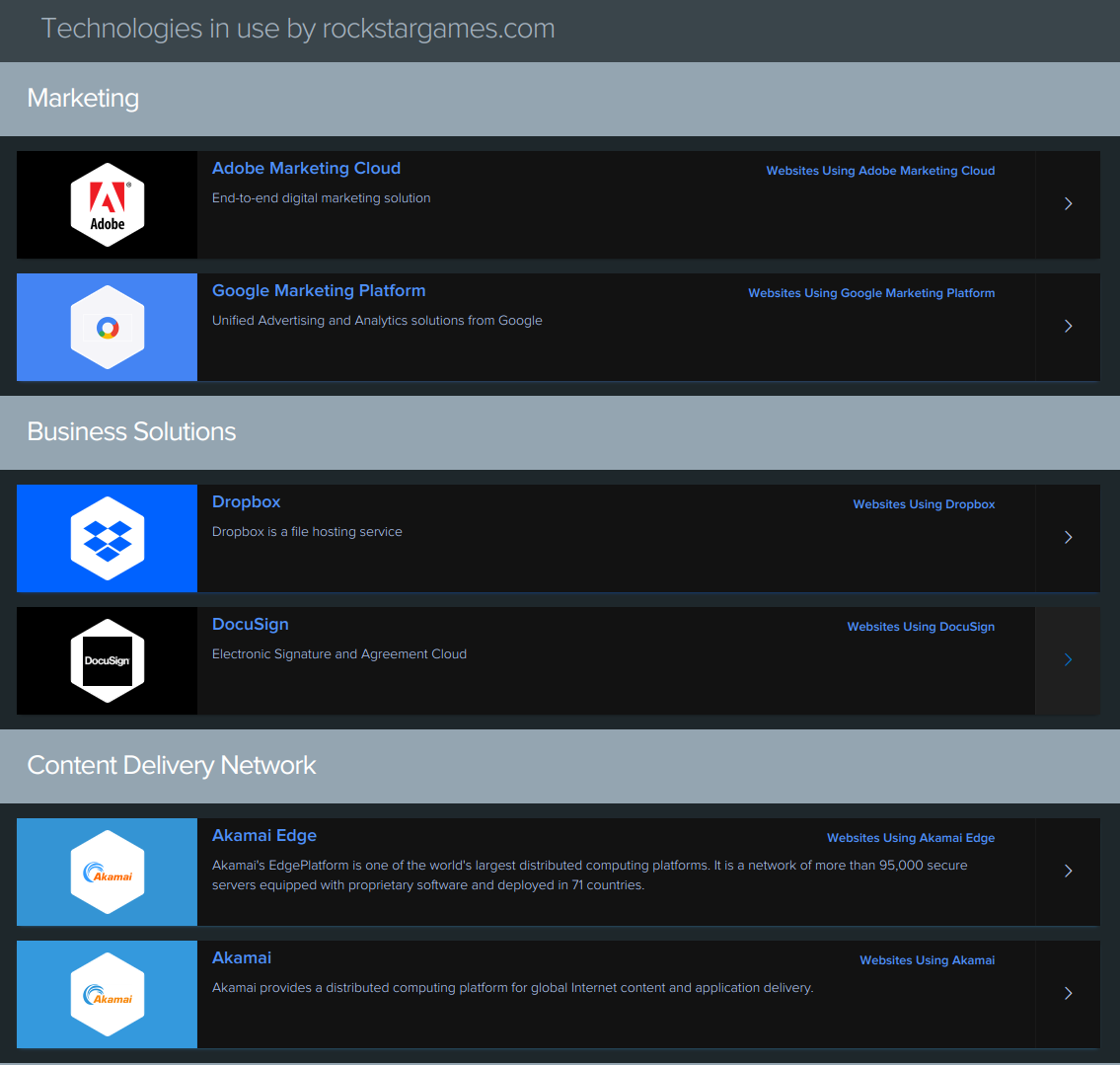
An edge SimilarTech has is the version tracking it offers. Recent technology changes are presented in a git-like timeline and you can even track them yourself by signing up for website alerts.
It also has a neat tool that lets you compare two technologies and generates an easy-to-follow technographic for the result.
All the perks can be availed at a decent range of plans starting from $199 a month, billed annually. Enterprises can book a demo via the official site.
Pros:
- Detailed Market Analysis: Provides in-depth market analysis and insights into the usage of various technologies across different industries and geographies.
- Competitor Tracking: Allows businesses to track technology adoption by competitors, helping to inform strategic decisions.
- Extensive Database: Maintains a large and comprehensive database of websites and technologies, offering robust data for analysis.
Cons:
- High Cost: Accessing the full range of features and data can be expensive, making it less accessible for small businesses or individual users.
- Complex Interface: The platform can be complex to navigate for new users, requiring a learning curve to utilize its full potential.
- Data Accuracy: Like other similar tools, there can be occasional inaccuracies or outdated information in the technology detection.
Hunter TechLookup
Hunter.io has technology lookup as a secondary venture. It's primarily an email outreach platform specializing in email search and verification. It's powerful for use cases involving lead generation, or verification from existing lead lists.
An important fact to know is that Hunter TechLookup maps technologies to companies, and not the other way around. For example, it's easy to find a list of websites using Apache, but Hunter TechLookup can't list the technologies any venture (e.g. Amazon) is using.
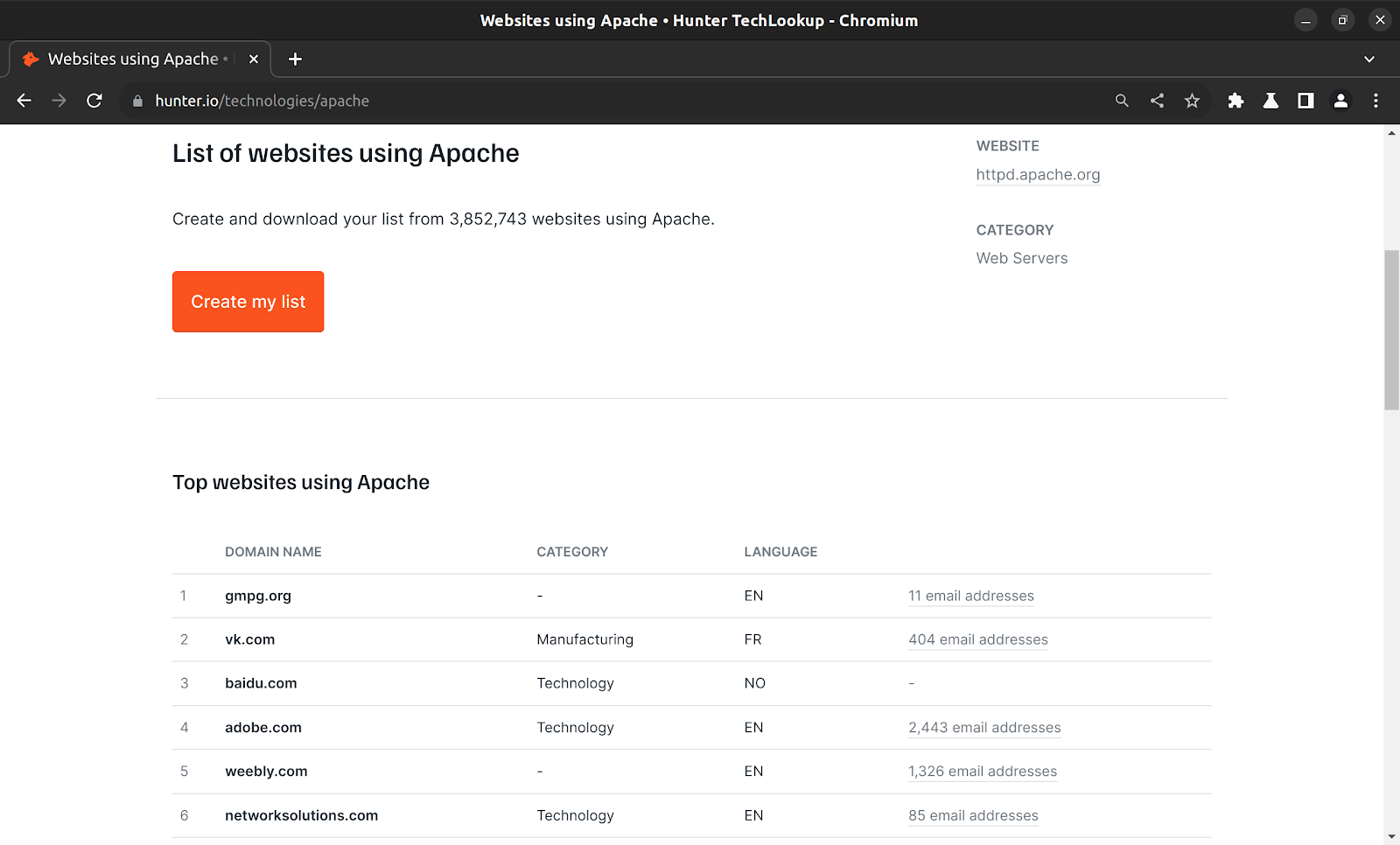
The tech stack information can be found online at their official site. They also have affordable and diverse pricing and even a free plan. The Starter Plan is priced at just $34 which might get small businesses up and running to solve their profiling needs in no time.
Pros:
- Email Finder Integration: Combines technology lookup with email-finding capabilities, making it useful for sales and marketing prospecting.
- User-Friendly Interface: Offers a simple and intuitive interface that is easy to use, even for beginners.
- Free Tier: Provides a free tier with basic functionalities, allowing users to test the service before committing to a paid plan.
Cons:
- Limited Technology Detection: Primarily focused on finding email addresses, so its technology lookup capabilities might be less comprehensive compared to dedicated tools.
- Data Limitations: The free tier has limited queries, which might not be sufficient for heavy users or larger companies.
- Subscription Required for Full Features: Advanced features and higher usage limits require a subscription, which can be costly.
WhatRuns
WhatRuns is a free service which is also the most minimalist of the options; both in usage and the options provided. The website doesn't provide a search option for technology lookup. The only way to use it is via browser extensions available for Firefox and Google Chrome.
The analytic report provided is more concise than other available tools and does not include content management system information either.
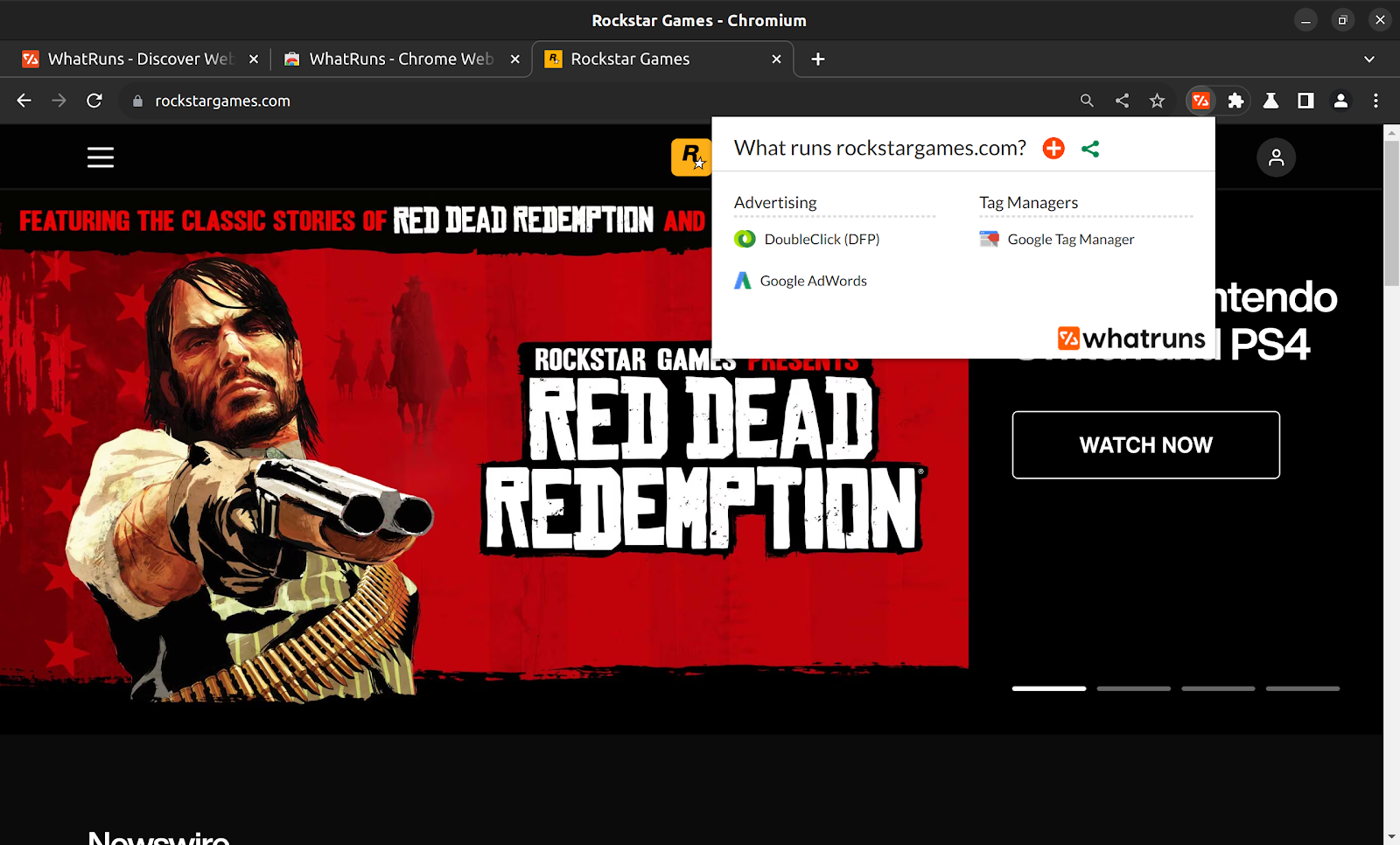
While WhatRuns falls a little short for sales tasks such as lead generation, it's an excellent lightweight, free tool for someone who's not interested in websites' sales aspects, and just in the technologies they use.
But if your priority is a BuiltWith alternative for sales, you may want to use other tools mentioned in this blog. It provides all insights for free and doesn't have any paid options.
Pros:
- Real-Time Detection: Provides real-time detection of technologies used on websites, including CMS, frameworks, plugins, and more.
- Easy-to-Use Extension: Available as a browser extension, making it convenient to analyze websites on the go.
- Free to Use: Offers a free version with a wide range of features, making it accessible to all users.
Cons:
- Detection Accuracy: May not always detect custom-built or less common technologies accurately.
- Limited Data Insights: Focuses primarily on technology detection without offering deeper market or competitor analysis.
- Dependency on Extension: Requires users to install a browser extension, which some users might find inconvenient or be concerned about privacy.
Ful.io
It wouldn't be wrong to say I saved the best for the last.
Ful.io brings the best of all worlds by doing anything BuiltWith can and more.
It is a crossover between technographics and sales, where it offers live analytics using a browser extension. They even offer an API at the best price I've seen. The analytics cover everything from technology lookups to company profiles.
The best part is that it simply works.
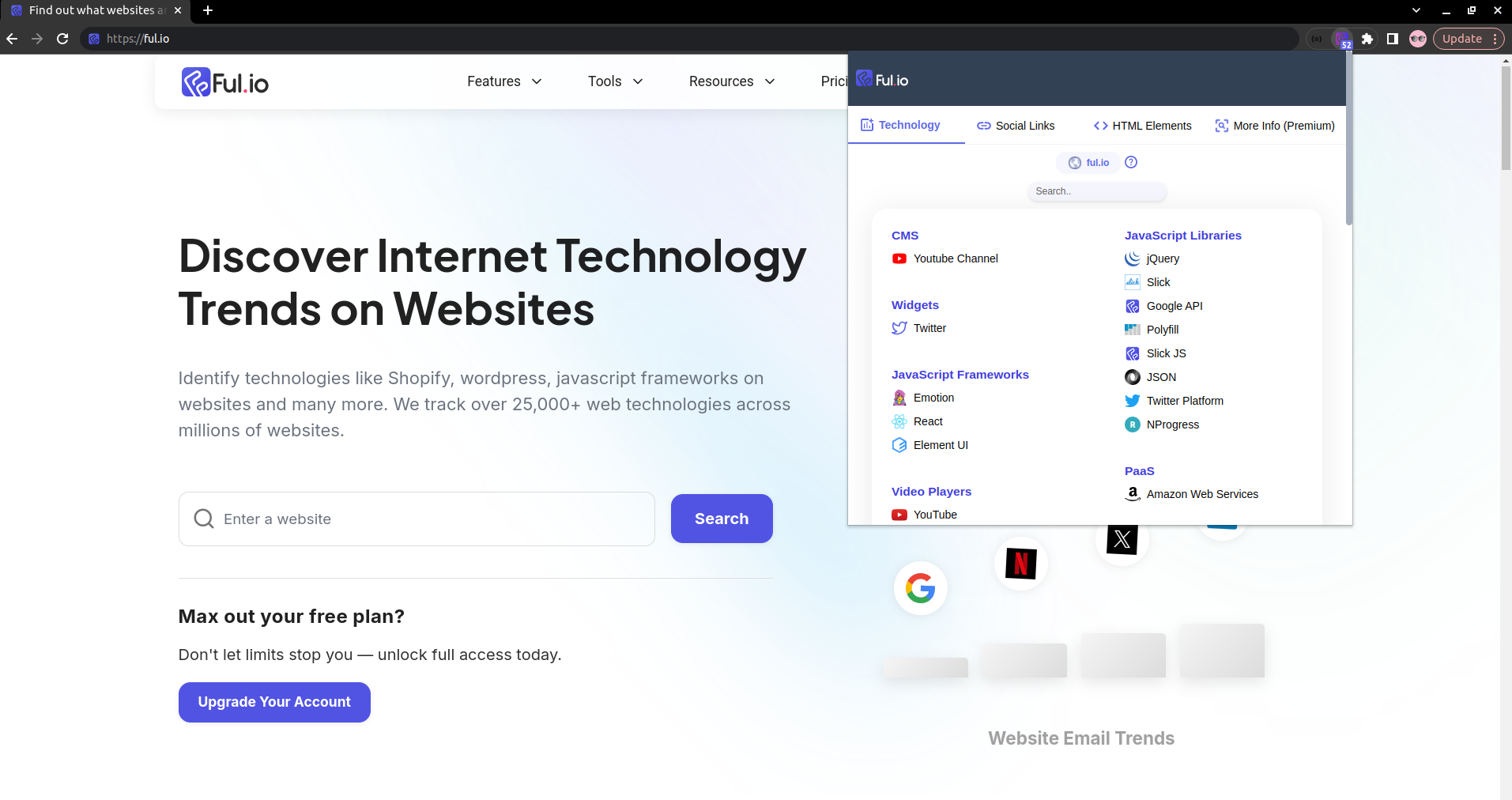
Ful.io makes it clear from the get-go that it is not just a profiling tool. Instead, it expands to be a well-rounded business intelligence tool. Instead of being a BuiltWith alternative, Ful.io is a much broader tool that’s also capable of doing anything that BuiltWith does.
Customer feedback is also valued in development decisions, ensuring a great user experience. The list of what Ful.io helps me with in my day-to-day workflow:
- Identifies the technology stack being used with frightening efficiency. Includes frameworks, widgets, content management systems, and more in the results.
- Provides real-time company enrichment data including SEO metrics, technology trends, workforce statistics, and more. Easy market research in one click.
- Makes lead generation effortless by sourcing relevant emails, contacts, and online profiles. It's an extra pair of hands on the table for competitor analysis.
Out of every tool I tried, Ful.io has the most detailed profile report and offers the most comprehensive list of technologies. It's also lightning-fast and offers an API for pretty much any use case I can face at work. Lead generation and competitor analysis no longer feel as daunting as they did before using Ful.io.
Which One to Choose?
There isn't a shortage of tech lookup tools like these at all! The best practice is to pick one based on your specific needs. At the end of the day, the best BuiltWith alternative is the one that fits your requirements. Analytics tools enable a data-driven approach that almost always works better than plain intuition.
Lead generation strategies developed around real-time data and industry trends have proven to have a higher success rate than cold outreaches with shallow planning.
When choosing marketing tools, it's not necessary to stick to one. Carefully curating your inventory ensures the best decisions for your business by harnessing the best features of individual tools.
In my case, Ful.io turned out to be the most productive, easy-to-use, one-stop option. It is not just an alternative to BuiltWith, it's a complete sales solution jam-packed with competitive intelligence.
Personally, I'll continue to use Ful.io to gain insights and stay on top of the competition.
